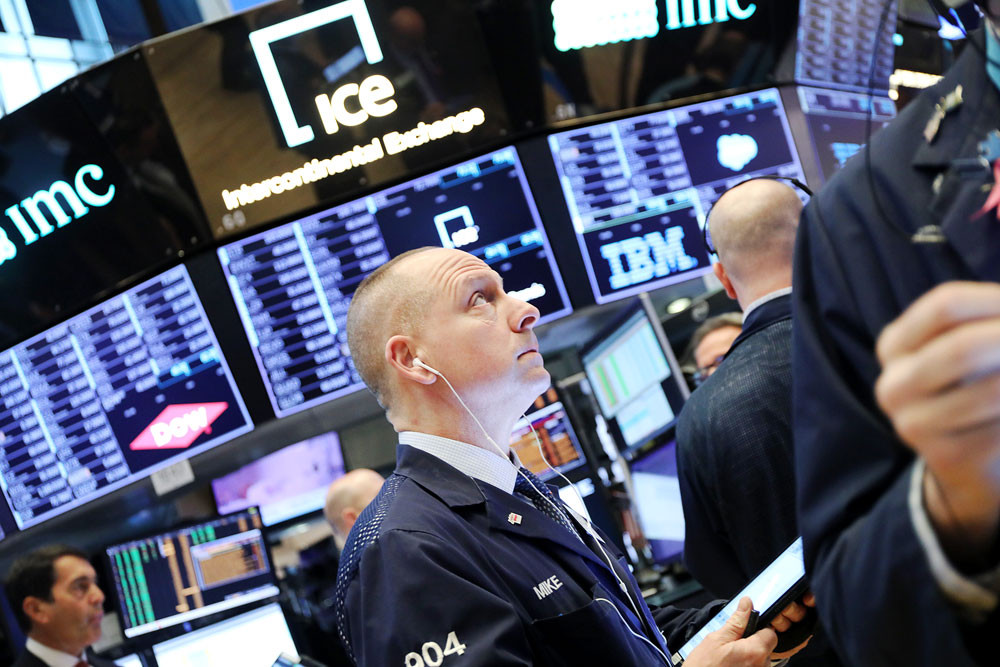Popular Reads
Top Results
Can't find what you're looking for?
View all search resultsPopular Reads
Top Results
Can't find what you're looking for?
View all search resultsGlobal equity markets crash on virus fears, oil prices plunge
Trading floors were a sea of red, with Tokyo plunging more than five percent, while Hong Kong dived 4.2 percent. Sydney shed 7.3 percent. London and Frankfurt plunged more than eight percent at the open, while Paris retreated 4.2 percent.
Change text size
Gift Premium Articles
to Anyone
 Traders work on the floor of the New York Stock Exchange on Monday in New York City. Markets around the world continued to decline on Monday as investors reacted to increased concerns of a global slowdown. Asian markets mostly rose on Tuesday after the previous day’s steep losses.
(AFP/Spencer Platt)
Traders work on the floor of the New York Stock Exchange on Monday in New York City. Markets around the world continued to decline on Monday as investors reacted to increased concerns of a global slowdown. Asian markets mostly rose on Tuesday after the previous day’s steep losses.
(AFP/Spencer Platt)
E
quity markets collapsed Monday as the rapidly spreading coronavirus fans fears for the global economy, while a crash in oil prices added to the panic with energy firms taking a hammering and wiping hundreds of billions off valuations.
As the deadly disease claims more lives around the world, dealers are shedding riskier assets for safe havens, sending gold and the yen surging and pushing US Treasury yields to record lows.
While governments and central banks have unleashed or prepared stimulus measures, the spread of COVID-19 is putting a huge strain on economies and stoking concerns of a worldwide recession.
Trading floors were a sea of red, with Tokyo plunging more than five percent, while Hong Kong dived 4.2 percent. Sydney shed 7.3 percent.
Bangkok crashed more than eight percent, Singapore and Jakarta were more than five percent down. Manila and Mumbai lost more than six percent, while Shanghai, Taipei and Wellington were around three percent down.
London and Frankfurt plunged more than eight percent at the open, while Paris retreated 4.2 percent.
The losses followed sharp falls in Europe and Wall Street on Friday.
Read also: Oil plunges about 30% after Saudi Arabia slashes prices, opens taps
Driving the declines was a ferocious sell-off in the oil markets, sparked by top exporter Saudi Arabia slashing prices – in some cases to unprecedented levels – after a bust-up with Russia over production.
Both main oil contracts – which had already been under pressure over falling demand caused by the virus – dived around 30 percent, marking the worst drop since the 1991 Gulf War and the second biggest fall on record, according to Bloomberg News.
Saudi equities tanked more than nine percent with oil titan Aramco losing 10 percent. Dubai and Kuwait sank a similar amount, while Abu Dhabi equities were almost eight percent down.
Saudi Arabia launched an all-out oil war Sunday with the biggest cut in its prices in the past 20 years, Bloomberg News reported, after OPEC and its allies failed to clinch a deal to reduce output.
A meeting of main producers was expected to agree to deeper cuts to counter the impact of the coronavirus -- but Moscow refused to tighten supply.
In response, Riyadh slashed its price for April delivery by $4-$6 a barrel to Asia and $7 to the United States.
Russia's decision not to comply had already battered prices and there are warnings they could continue to drive lower towards $20 if the two sides do not reach an agreement.
"Something like this could have more global repercussions than a trade war between China and the US because oil touches so many things in the world economy," said Rohitesh Dhawan, director of energy, climate and resources at Eurasia Group in London.
Energy firms hammered
Jeffrey Halley, senior market analyst at OANDA, said: "Saudi Arabia seems intent on punishing Russia.
"Oil prices... will likely be capped over the next few months as coronavirus stalls economic growth, and Saudi Arabia opens the pumps and offers huge discounts on its crude grades."
Energy firms were slammed, with Hong Kong-listed CNOOC tumbling 17 percent and PetroChina down more than nine percent, while in Tokyo, Inpex dived 13 percent. In Sydney, Santos dived 27 percent and Woodside Petroleum tanked 18.4 percent, while BHP was more than 14 percent down.
"Plummeting oil prices and spreading coronavirus are fanning fears of downside risks to the global economy," said Takuya Kanda, at Gaitame.com Research Institute.
Foreign exchange markets were also extremely volatile, with traders snapping up the yen -- seen as a hedge against global instability -- and selling off the dollar owing to uncertainty over the coronavirus in the United States.
Read also: Panic selling hits Indonesia, Philippine stocks set for bear run
Marito Ueda, senior trader at FX Prime, told AFP: "Fears over the virus's impact on the global economy and a plummet in US yields had investors seeking the safe-haven yen."
"It is essentially a flight from the dollar," he added.
The greenback fell below 103 yen, levels not seen since the third quarter of 2016.
Currencies of countries that rely on oil cash were among the worst hit, with Russia's ruble almost six percent lower, Australia's dollar diving five percent at one point and Mexico's peso also down five percent.
Analysts warned of further gyrations as the outbreak shows no sign of abating, with more than 110,000 people infected in scores of countries.
Italy, which is now the hardest-hit country outside China, has put a quarter of its population in lockdown, while sporting and public events around the world have been cancelled.
"You just don't know which way things are going to go, it makes it very hard to price anything right now," said Sarah Hunter, chief economist for BIS Oxford Economics, on Bloomberg TV.
"We're seeing that in the market with the wild oscillations that are coming through."









